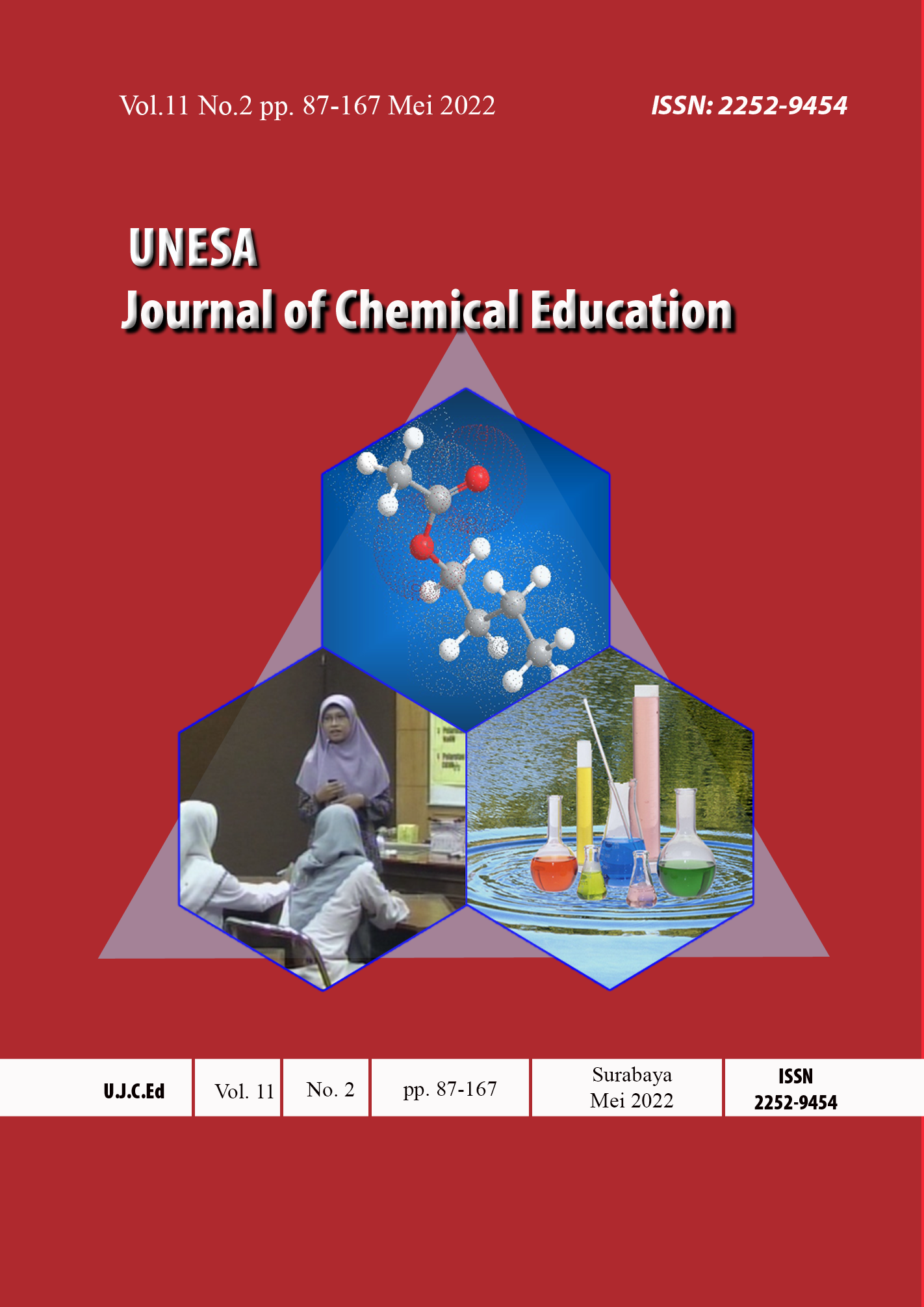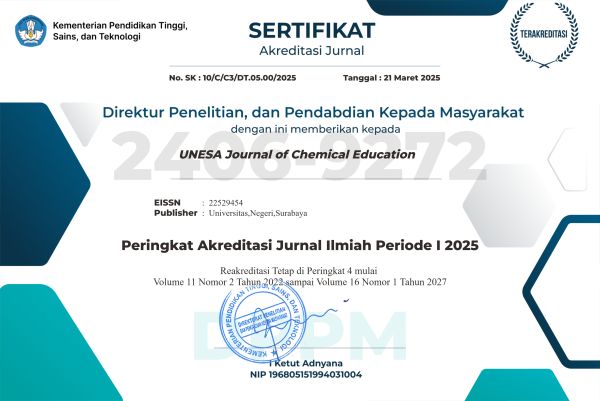THE INFLUENCE OF THE NATURAL PRODUCT PRACTICUM ON DECISION MAKING SKILLS
DOI:
https://doi.org/10.26740/ujced.v11n2.p136-142Keywords:
Decision Making Skills, Natural Product Chemistry Practicum, Secondary MetabolitesAbstract
The study of secondary metabolites is the core of Natural Product Chemistry. The process of isolating secondary metabolites from Sasambo plants, which are medicinal plants used by indigenous tribes in West Nusa Tenggara province, Indonesia, has the potential to be integrated into the Natural Product Chemistry Practicum. Students learn how to extract, fractionate, purify, and identify the structure of secondary metabolites through Natural Product Chemistry Practicum. With various alternative actions related to the process of isolating secondary metabolites, these laboratory exercises can be utilized to help students improve their decision-making skills. This study aims to investigate the impact of Natural Product Chemistry Practicum Based on Medicinal Plants Sasambo (NPP-MPS) on students' decision-making skills. This is quasi-experimental research with nonequivalent control group pretest-posttest research design. The participants are 63 students who enrolled in 6th semester students of the chemistry education department at one of the state universities in West Nusa Tenggara, Indonesia, for the 2019/2020 academic year, which were divided into experimental and the control classes. The findings show that the NPP-MPS does positively influences students' decision-making skills.
Downloads
References
Hakim, A., Jufri, A. W., Jamaluddin, Supriadi, & Mutmainnah, P. A. 2020. Understanding the uniqueness of artocarpus flavonoids: isolation and structure elucidation of cycloartocarpin from the roots of Artocarpus altilis. Journal of Chemical Education, Vol 97, No 11, pp. 4133-4136.
Hakim, A., Jufri, A. W., & Jamaluddin. 2019. Innovative natural product chemistry laboratory: isolation of artelastin from Artocarpus scortechinii. In AIP Conference Proceedings, Vol 2199, No 1, pp. 050001.
Raharjo, Tri Joko. 2013. Kimia Hasil Alam. Yogyakarta: Pustaka Pelajar.
Hakim, A., & Jufri, A. W. 2018. Natural products laboratory project: isolation and structure elucidation of piperin from Piper nigrum and andrographolide from Andrographis paniculata. Journal of Turkish Science Education, Vol 15, No 4, pp. 27-36.
Yamin, M., Burhanudin, Jamaluddin, & Nasruddin 2018. Pengobatan dan obat tradisional suku Sasak di Lombok. Jurnal Biologi Tropis, Vol 18, No 1, pp. 1-12.
Jannah, H., & Safnowandi. 2018. Identifikasi jenis tumbuhan obat tradisional di kawasan hutan Olat Cabe desa Batu Bangka kecamatan Moyo Hilir kabupaten Sumbawa Besar. Bioscientist: Jurnal Ilmiah Biologi, Vol 6, No 2, pp. 145-172.
Ani, N., Rohyani, S. I., & Maulana. 2018. Pengetahuan masyarakat tentang jenis tumbuhan obat di kawasan taman wisata alam Madapangga Sumbawa. Jurnal Pijar MIPA, Vol 13, No 2, pp. 160-166.
Tsaparlis, G., & Gorezi, M. 2007. Addition of a project-based component to a conventional expository physical chemistry laboratory. Journal of Chemical Education, Vol 84, No 4, pp. 668-670.
Ural, E. 2016. The effect of guided-inquiry laboratory experiments on science education students' chemistry laboratory attitudes, anxiety and achievement. Journal of Education and Training Studies, Vol 4, No 4, pp. 217-227.
Hakim, A., Liliasari, Kadarohman, A., & Syah, Y. M. 2016. Making a natural product chemistry course meaningful with a mini project laboratory. Journal of Chemical Education, Vol 93, No 1, pp. 193-196.
Gutierez, S. B. 2015. Integrating Socio-Scientific Issues to Enhance the Bioethical Decision-Making Skills of High School Students. International Education Studies, Vol 8, No 1, pp. 142-151.
Candra, R. A., Prasetya, A. T., & Hartati, R. 2019. Analisis kemampuan berpikir kreatif peserta didik melalui penerapan blended project-based learning. Jurnal Inovasi Pendidikan Kimia, Vol 13, No 2, pp. 2437- 2446.
Suryanti. 2012. Efektivitas model pembelajaran multi-siklus deal untuk mengajarkan keterampilan pengambilan keputusan siswa SD. Jurnal Sekolah Dasar, Vol 21, No 1, pp. 1-8.
Creswell, J. W. 2010. Research design: pendekatan kualitatif, kuantitatif, dan mixed. Yogjakarta: PT Pustaka Pelajar.
Schoffstall, A. M., & Gaddis, B. A. 2007. Incorporating guided-inquiry learning into the organic chemistry laboratory. Journal of Chemical Education, Vol 84, No 5, pp. 848- 851.
Tawil, M., & Liliasari. 2013. Berpikir kompleks dan implementasinya dalam pembelajaran IPA. Makasar: Badan Penerbit UNM.
Hake, R. 1998. Interactive-engagement vs traditional methods: a six-thousand-student survey of mechanics test data for introductory physics courses. American Journal of Physics, Vol 66, No 1, pp. 64-74.
Widyaningsih, S. W., Yusuf, I., Prasetyo, Z. K., & Istiyono, E. 2021. The development of the HOTS test of physics based on modern test theory: question modeling through e learning of moodle LMS. International Journal of Instruction, Vol 14, No 4, pp. 51- 68.
Utama, C., Nurkamto, J., & Wiranto. 2020. The Instrument Development to Measure Higher-Order Thinking Skills for Pre-Service Biology Teacher. International Journal of Instruction, Vol 13, No 4, pp. 833-848.
Nainggolan, B., Hutabarat W., Situmorang, M., & Sitorus, M. 2020. Developing innovative chemistry laboratory workbook integrated with project–based learning and character-based chemistry. International Journal of Instruction, Vol 13, No 3, pp. 895- 908.
Woolever, R. & Scott, K. P. 1998. Active Learning in Social Studies: Promoting Cognitive and Social Growth. Illinois: Scott, Foresman and Company.
Robinson, J. K. 2013. Project-based learning: improving student engagement and performance in the laboratory. Analytical and Bioanalytical Chemistry, Vol 405, pp. 7–13.
Bretz, S. L., Fay, M., Bruck, L. B., & Towns, M. H. 2013. What faculty interviews reveal about meaningful learning in the undergraduate chemistry laboratory. Journal of Chemical Education, Vol 90, No 3, pp. 281-288.
Ural, E. 2016. The Effect of Guided-Inquiry Laboratory Experiments on Science Education Students' Chemistry Laboratory Attitudes, Anxiety and Achievement. Journal of Education and Training Studies, Vol 4, No 4, pp. 217-227.
Parker, A. M., & Fischhoff, B. 2005. Decision‐ making competence: External validation through an individual‐ differences approach. Journal of Behavioral Decision Making, Vol 18, No 1, pp. 1-27.
Downloads
Published
Issue
Section
License
The license terms of the Creative Commons Attribution-NonCommercial 4.0 International (CC BY-NC 4.0) requires attribution to the original creator, permits non-commercial use, and does not allow for the application of legal or technological restrictions on others' use.
 Abstract views: 258
,
Abstract views: 258
, PDF Downloads: 159
PDF Downloads: 159













